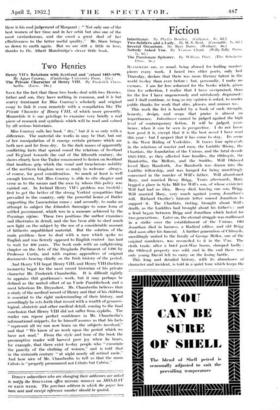Two Henries
Henry VII's Relations with Scotland and ',eland 14854498.
By Agues Conway. (Cambridge University Press. Its.)
The Private Character of Henry VIII. By Frederick Cham- berlin. (Lane. 18s.) SAVE for the fact that these two books deal with two Henries. father and son, they have nothing in common, and it is but scurvy treatment for Miss Conway's scholarly and original] essay to link it even remotely with a compilation like -The Private Character of henry VIII, of which more presently. Meanwhile it is our privilege to examine very briefly a real piece of research and synthesis which will be read and valued by all serious historians.
Miss Conway cults her book " dry," but it is so only with a. difference. The material she works in may be that, but out of her manipulation of it emerge certain pictures which are both new and far from dry. In the dark mazes of apparently conflicting facts that spread to I the relations of Scotland and Ergland towards the end of the fifteenth century. she shows clearly how the Tudor continence(' to fasten tin Seothand that insidious grip which the venal and treacherous nobility of the northern kingdom were so ready to welcome---always. . of course, for good consideration. So much at least is well enough known, hut. Miss Conway is able to cite chapter and verse as to the means and the men by whom this policy was carried out. In Ireland henry V11's problem was twoffild : first to get the better of the strong Yorkist sympathies that prevailed in the country, only the powerful house .of Butler supporting the Lancastrian cause ; and secondly, to make an attempt to subject the Irlandois Sauvaiges to sonic form of settled government, which was in a measure achieved by the Poynings ritime. These two positions the author examines 'told illustrates in detail, and she has been able to shed much new light on the subject by the use of a considerable amount of hitherto unpublished material. But the solution of the main problem—how to deal with a race which spoke no English and was fiercely opposed to English control –has had to wait for 400 years. The book ends with an enlightening chapter on the Acts of the Drogheda Parliament. of 1496by Professor Curtis, and with copious appendices of original doemnents bearing chiefly on the Irish history of the period.
And Henry VII begat henry VIII, and ]henry VIII (luckless monarch) begat for the most recent historian or his private character Mr. Frederick Chamberlin. It is difficult rightly • to appraise this gentleman's work, but it may perhaps he defined as the united effort of an Uncle Pumblechook anti a most laborious Dr. Dryasduit. Mr. Chamberlin believe,: that. a study of the medical record of Henry and that of his children is essential to the right understanding of their history, and accordingly he sets forth that record with a wealth of gynaeco- logical, obstetric and other medical detail, coming to the final conclusion that Henry VIII did not suffer from syphilis. The reader can repose perfect confidence in Mr. Chamlwrlin's inforniational snippets, for he himself assures us that his fiats " represent all we can now learn on the subjects involved," and that " We know of no work upon the period which we have not read." Front the style and tone of the book the presumptive reader will harvest pure joy when he hears. for example, that there exist to-day people who " excoriate the paucity of the clothing of women," and is told that in the sixteenth century " at night nearly all retired nude." And how nice of Mr. Chamberlin to tell us that the name Cabots is " properly pronounced not Ulnas but Ciffittsc."
































 Previous page
Previous page